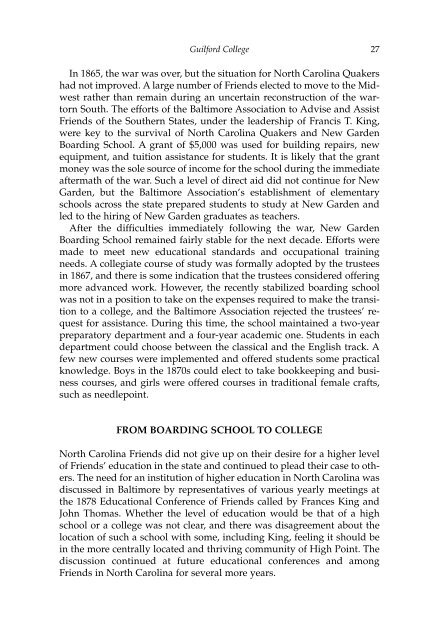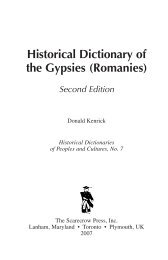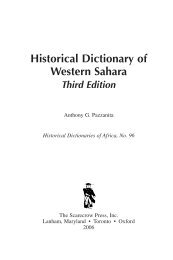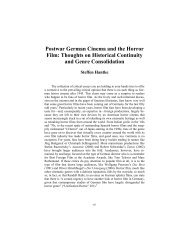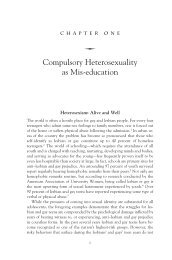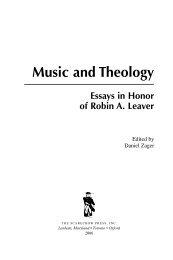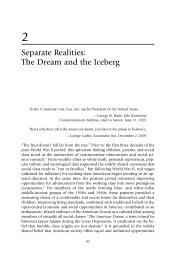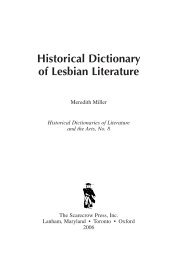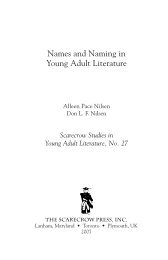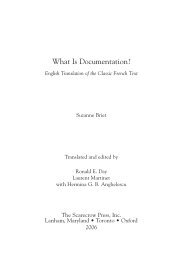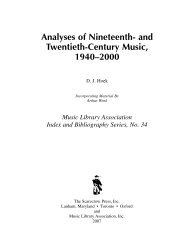Founded by Friends : the Quaker heritage of fifteen - Scarecrow Press
Founded by Friends : the Quaker heritage of fifteen - Scarecrow Press
Founded by Friends : the Quaker heritage of fifteen - Scarecrow Press
Create successful ePaper yourself
Turn your PDF publications into a flip-book with our unique Google optimized e-Paper software.
Guilford College 27<br />
In 1865, <strong>the</strong> war was over, but <strong>the</strong> situation for North Carolina <strong>Quaker</strong>s<br />
had not improved. A large number <strong>of</strong> <strong>Friends</strong> elected to move to <strong>the</strong> Midwest<br />
ra<strong>the</strong>r than remain during an uncertain reconstruction <strong>of</strong> <strong>the</strong> wartorn<br />
South. The efforts <strong>of</strong> <strong>the</strong> Baltimore Association to Advise and Assist<br />
<strong>Friends</strong> <strong>of</strong> <strong>the</strong> Sou<strong>the</strong>rn States, under <strong>the</strong> leadership <strong>of</strong> Francis T. King,<br />
were key to <strong>the</strong> survival <strong>of</strong> North Carolina <strong>Quaker</strong>s and New Garden<br />
Boarding School. A grant <strong>of</strong> $5,000 was used for building repairs, new<br />
equipment, and tuition assistance for students. It is likely that <strong>the</strong> grant<br />
money was <strong>the</strong> sole source <strong>of</strong> income for <strong>the</strong> school during <strong>the</strong> immediate<br />
aftermath <strong>of</strong> <strong>the</strong> war. Such a level <strong>of</strong> direct aid did not continue for New<br />
Garden, but <strong>the</strong> Baltimore Association’s establishment <strong>of</strong> elementary<br />
schools across <strong>the</strong> state prepared students to study at New Garden and<br />
led to <strong>the</strong> hiring <strong>of</strong> New Garden graduates as teachers.<br />
After <strong>the</strong> difficulties immediately following <strong>the</strong> war, New Garden<br />
Boarding School remained fairly stable for <strong>the</strong> next decade. Efforts were<br />
made to meet new educational standards and occupational training<br />
needs. A collegiate course <strong>of</strong> study was formally adopted <strong>by</strong> <strong>the</strong> trustees<br />
in 1867, and <strong>the</strong>re is some indication that <strong>the</strong> trustees considered <strong>of</strong>fering<br />
more advanced work. However, <strong>the</strong> recently stabilized boarding school<br />
was not in a position to take on <strong>the</strong> expenses required to make <strong>the</strong> transition<br />
to a college, and <strong>the</strong> Baltimore Association rejected <strong>the</strong> trustees’ request<br />
for assistance. During this time, <strong>the</strong> school maintained a two-year<br />
preparatory department and a four-year academic one. Students in each<br />
department could choose between <strong>the</strong> classical and <strong>the</strong> English track. A<br />
few new courses were implemented and <strong>of</strong>fered students some practical<br />
knowledge. Boys in <strong>the</strong> 1870s could elect to take bookkeeping and business<br />
courses, and girls were <strong>of</strong>fered courses in traditional female crafts,<br />
such as needlepoint.<br />
FROM BOARDING SCHOOL TO COLLEGE<br />
North Carolina <strong>Friends</strong> did not give up on <strong>the</strong>ir desire for a higher level<br />
<strong>of</strong> <strong>Friends</strong>’ education in <strong>the</strong> state and continued to plead <strong>the</strong>ir case to o<strong>the</strong>rs.<br />
The need for an institution <strong>of</strong> higher education in North Carolina was<br />
discussed in Baltimore <strong>by</strong> representatives <strong>of</strong> various yearly meetings at<br />
<strong>the</strong> 1878 Educational Conference <strong>of</strong> <strong>Friends</strong> called <strong>by</strong> Frances King and<br />
John Thomas. Whe<strong>the</strong>r <strong>the</strong> level <strong>of</strong> education would be that <strong>of</strong> a high<br />
school or a college was not clear, and <strong>the</strong>re was disagreement about <strong>the</strong><br />
location <strong>of</strong> such a school with some, including King, feeling it should be<br />
in <strong>the</strong> more centrally located and thriving community <strong>of</strong> High Point. The<br />
discussion continued at future educational conferences and among<br />
<strong>Friends</strong> in North Carolina for several more years.


